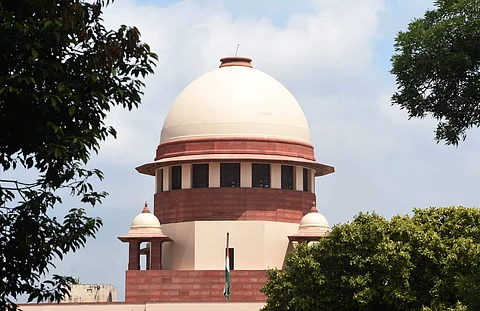

The Supreme Court has revised the date for hearing of petitions challenging the National Medical Commission’s (NMC) Bill regarding the fee regulation guidelines to September 30, tentatively. Earlier today, the SC had listed it for October 11.
The Centre had filed a counter affidavit to the pleas challenging the NMC's decision on September 21. The Bill insists that the fee for 50 per cent of seats in private medical colleges and Deemed-to-be Universities must be on par with the fee in government medical colleges in the respective State or Union Territories, according to the memorandum issued in February this year.
The apex court had earlier agreed to hear petitions by private medical colleges associations challenging the validity of the order, yesterday, September 23. However, the issue has now tentatively been listed for hearing on September 30, 2022 instead, as per details on the Supreme Court’s website.
Advocate Anubha Shrivastava said that the government must expedite the process if it wants colleges to implement the bill. “It is upto the government to take it up in the court so that from this academic year, the bill can be implemented,” she said.
Experts’ views
Meanwhile, some experts opined that the delay in hearing will not affect the ongoing counselling process for the National Eligibility cum Entrance Test (NEET) 2022 as it cannot be implemented from this academic year. “Several high courts, such as those of Kerala and Madras have ruled against the bill and hence, the implementation has not been done,” said Manickavel Arumugam, a NEET expert and Founder of JustGetMBBS.
To recall, groups of private medical colleges challenged the memorandum in the High Courts of both states.
In fact, the Madhya Pradesh High Court too, which issued a notification on September 13 for implementation of the Bill, has now declared a stay on the order, according to reports. “It has not been accepted anywhere across India but this won’t affect the counselling process,” said Manickavel.
The Medical Counselling Committee (MCC) has already begun the process of counselling for NEET PG 2022. The registration process for round one of the counselling process ended yesterday, September 23.
Students’ concerns
Students have taken to Twitter to raise concerns regarding delay in implementation of the Bill. “Choice filling will start from today. Still no sign of NMC and almost all the deemed colleges have declared their fees structure without mentioning of nmc bill…,” Ayush, a user on Twitter said.
Another medico PR Behera said, “Please implement the NMC bill regarding 50 percent seats as many people are poor. Their children can study MBBS and PG courses easily. It will be good for a healthy society,” in a post on Twitter.
Others too aired the same concerns. “Please clear out the NMC guidelines for U.P for all Medical PG candidates waiting in the counselling to avail benefits from the NMC bill passed by the Honourable Parliament of India…,” another user Aainy Furrukh said on Twitter.
However, some experts said that it would not be practical for private colleges to implement this Bill. “If the said rule were to be implemented then the remaining 50 per cent of the fees would be doubled which would essentially mean that those 50 per cent of the students will be paying 100 percent of the fees,” said Jayaprakash Gandhi, an education consultant.
Alternative measures
States like Tamil Nadu already have fee regulatory committees in colleges that fix the fee structure, Manickavel had earlier informed EdexLive. “If the government is forcing them to fix it at government college fees then that would be unfair to private colleges,” he said. The NMC instead should come up with guidelines that fix the fees instead of trying to bring them on par with the government fee.
Secondly, not all colleges have enough funds to reduce their fees. “A proper audit of private institutes must be done to see if some private universities have a huge surplus of funds. If they do, then their fees can be reduced to that of government colleges fees. But if institutes do not have sufficient funding, then the government must provide them with aid,” Anubha explained.
